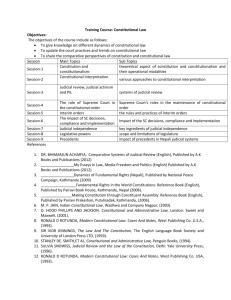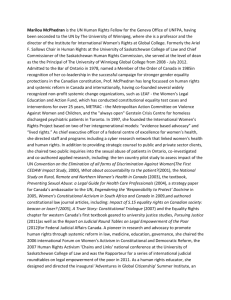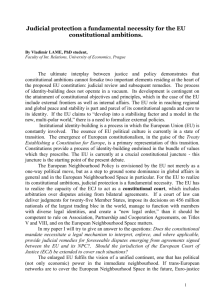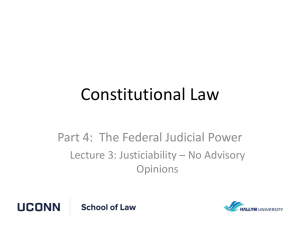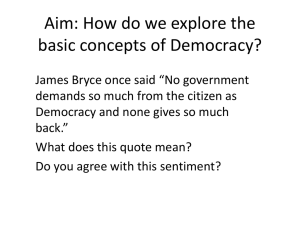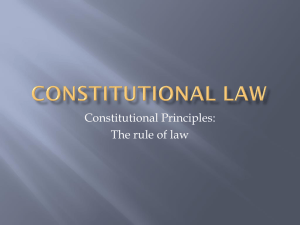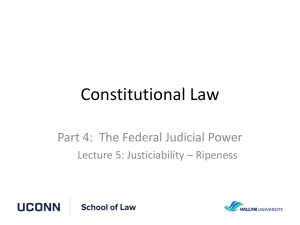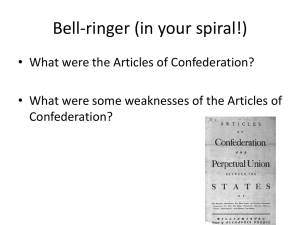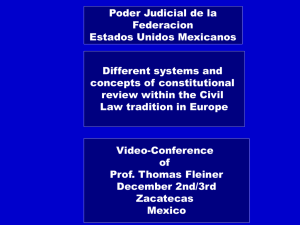Part 4, Lecture 7
advertisement
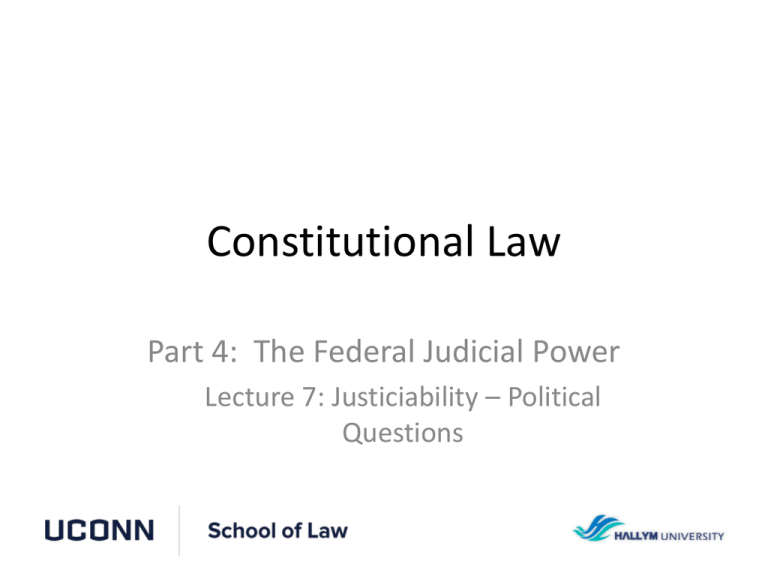
Constitutional Law Part 4: The Federal Judicial Power Lecture 7: Justiciability – Political Questions Political Question Doctrine • The political question doctrine says that some constitutional provisions are inappropriate for judicial review and must be left to the political branches of government to interpret and enforce. – Although there is an allegation that the Constitution has been violated, cases brought under these provisions are dismissed as non-justiciable political questions • There are two types of political questions: 1. Those issues that are committed by the Constitution to another branch of government. 2. Those issues that are inherently incapable of resolution and enforcement by the judicial process. Constitutional Law – Professor David Thaw Part 4 Lecture 7 Slide 2 Baker v. Carr (1962) Background • Baker filed suit against the Secretary of State of Tennessee alleging that the legislature had not redrawn its legislative districts since 1901, in violation of the Tennessee State Constitution which required redistricting according to the federal census every 10 years. • Baker, who lived in an urban part of the state, asserted that the changing demographics of the state had shifted a greater proportion of the population to the cities, thereby diluting his vote in violation of the Equal Protection Clause of the Fourteenth Amendment. Constitutional Law – Professor David Thaw Part 4 Lecture 7 Slide 3 Baker v. Carr Issue: Do federal courts have jurisdiction to hear a constitutional challenge to a legislative apportionment or is the issue of redistricting a political question? • The factors to be considered in determining whether a case presents a political question are (the Baker Criteria): – Whether there is a textually demonstrable constitutional commitment to coordinate a political department regarding the issue (such as foreign affairs or executive war powers). – Whether the case can be decided without an initial policy determination of a kind that is clearly not for judicial discretion. – Whether the court can undertake independent resolution without expressing lack of the respect for the doctrine of separation of powers. – Whether there are judicially discoverable and manageable standards for resolving the issue. – Whether there is an unusual need for unquestioning adherence to a political decision that has already been made. – Whether attempting to resolve the matter would create the possibility of embarrassment from different pronouncements by various departments on one question. Constitutional Law – Professor David Thaw Part 4 Lecture 7 Slide 4 Baker v. Carr Holding: A challenge to the reapportionment is not a political question because it relates to the state’s carrying out of rules in the Constitution. • An apportionment challenge that is based on the Guaranty Clause is nonjusticiable because they address issues solely directed to the political branches of the government by the Constitution. – When a question is entangled with any of the other two branches of the government, it is seen as a political question and the Court will not answer it without more clarification from the other branches. • However, in this case, Baker is claiming that he is being denied equal protection of the laws by being underrepresented in the state legislature. The equal protection challenge is separable from a political question, and is therefore justiciable. – Judicial standards under the Equal Protection Clause are well developed and familiar, and have been open to courts since the enactment of the Fourteenth Amendment. Constitutional Law – Professor David Thaw Part 4 Lecture 7 Slide 5 Applying the Baker Criteria • The Baker Criteria are difficult to apply and generally considered to be confusing and unsatisfactory. • The best way to understand the political question doctrine is to know the specific areas in which the Court has applied it: 1. 2. 3. 4. 5. The electoral process Foreign affairs Congress’s ability to regulate its internal processes The process for ratifying constitutional amendments Instances where the federal court cannot shape effective equitable relief 6. The impeachment process Constitutional Law – Professor David Thaw Part 4 Lecture 7 Slide 6


